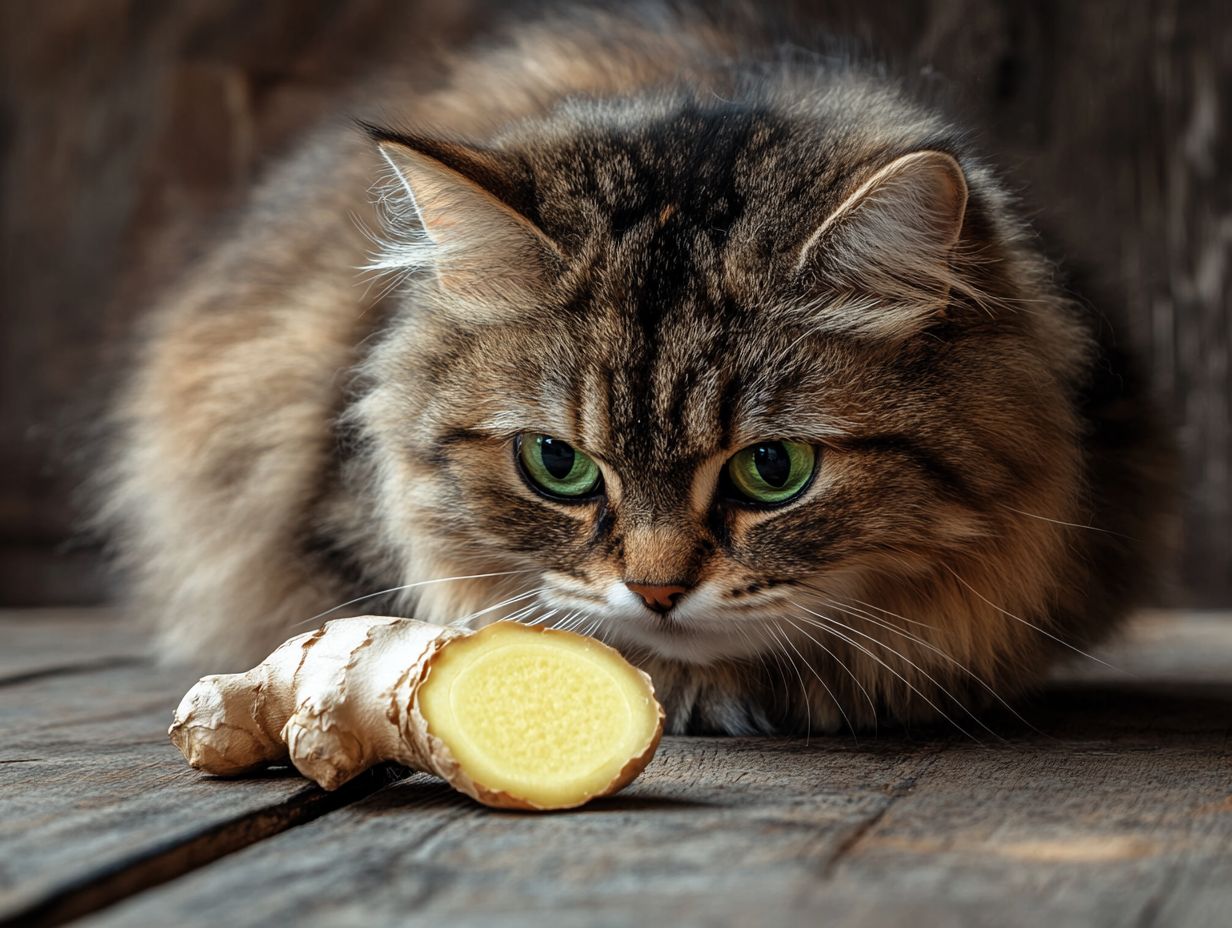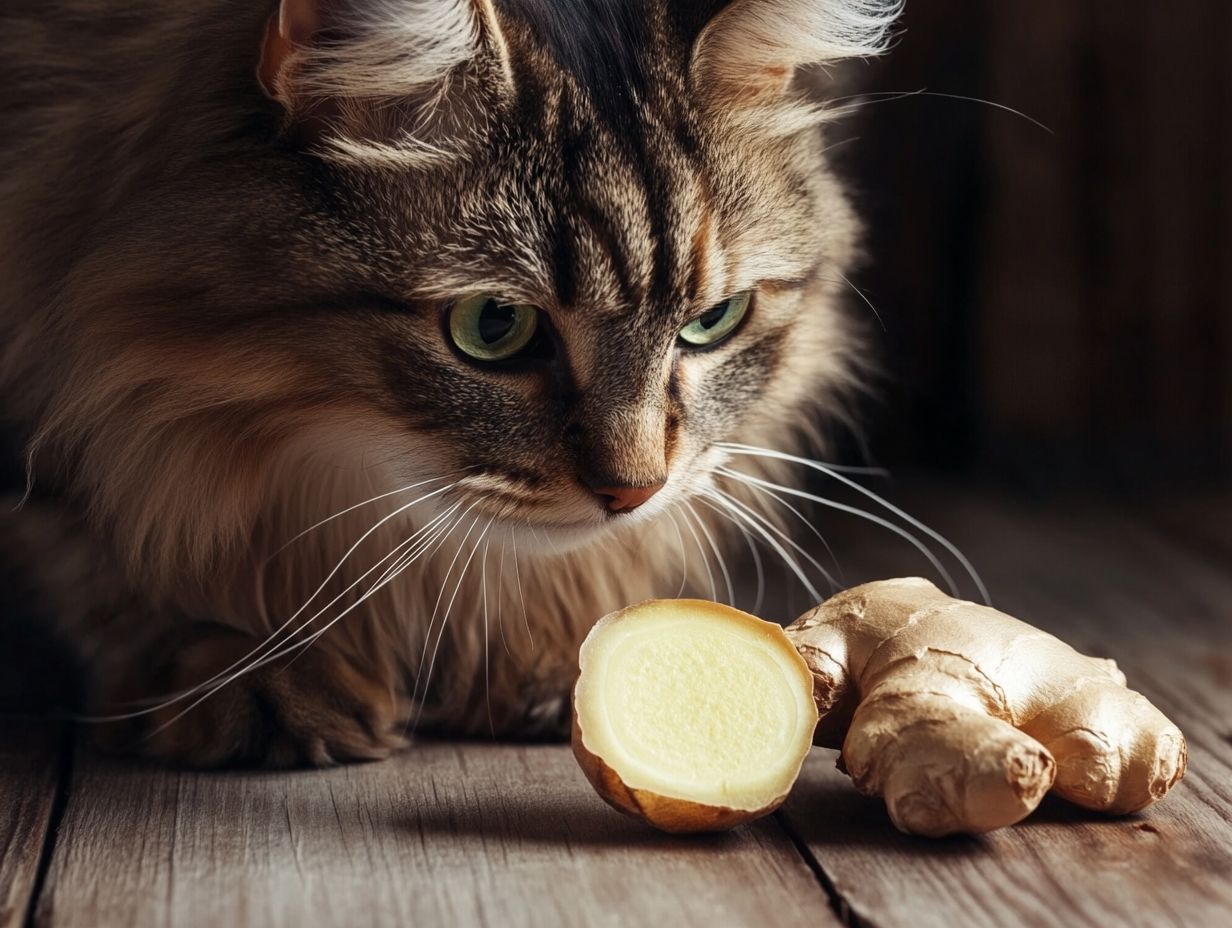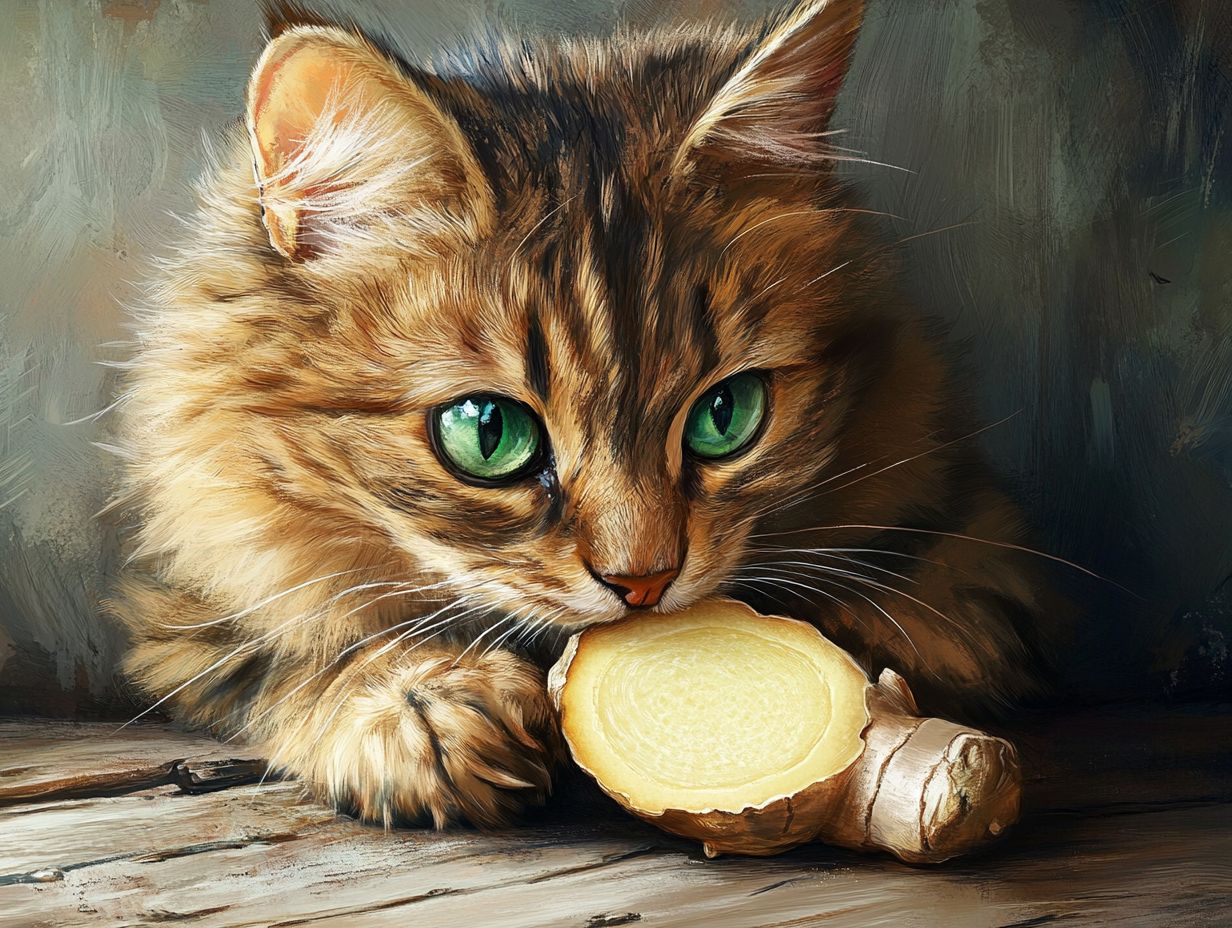While ginger may offer health benefits for cats, it is essential to approach its inclusion in their diet with caution. Many cat owners often wonder about the kinds of foods, such as ginger root and ginger snaps, they can safely share with their furry companions.
One common kitchen staple, ginger, has gained attention for its potential health benefits. But can cats eat ginger?
This article explores the dietary needs of cats, the advantages ginger may offer, and the possible risks involved, including allergies and interactions with medications. By understanding how to incorporate ginger safely into your cat’s diet, you can make informed decisions for their health and well-being.
Key Takeaways:

- Ginger can be beneficial for cats due to its anti-inflammatory and digestive properties.
- Consider potential risks such as irritation and gallbladder issues, and consult with a veterinarian before incorporating ginger into a cat’s diet.
- When incorporating ginger, follow recommended dosage and precautions to ensure safety and effectiveness.
Overview of Cats’ Dietary Needs
Cats are obligate carnivores, meaning their proper diet should consist of meat-based proteins, fatty acids, amino acids, vitamins, and minerals. A balanced cat diet provides essential macronutrients and micronutrients crucial for digestive health, immune function, and overall vitality.
Understanding the dietary requirements of cats is crucial for their well-being. Fats offer concentrated energy sources and support healthy skin and coats. Vitamins A, D, E, and B-complex are vital for vision, bone health, and metabolic processes. Calcium and phosphorus are essential for bones and teeth development, while trace minerals like zinc support immune functions.
Note that the dietary needs of individual cats can vary widely; some may require specific diets based on age or health conditions. Regular consultations with a veterinarian can help ensure that a cat’s dietary needs are met.
Can Cats Eat Ginger?
Ginger, scientifically known as *Zingiber officinale*, is a common ingredient found in many foods and nutritional supplements. However, is ginger safe for cats?
While ginger offers various health benefits, it is important to consult your veterinarian before adding it to your cat’s diet to avoid any adverse reactions. Cats have different metabolisms than humans, and what may be healthy for humans could lead to gastrointestinal upset or other issues in cats.
Some studies suggest that ginger may help relieve nausea and assist with joint health, making it of interest to pet owners seeking natural remedies. The dosage and form of ginger given can significantly impact its safety and effectiveness. Therefore, veterinary guidance is essential to determine appropriate dietary additions to keep your pet healthy.
Benefits of Ginger for Cats

- Anti-inflammatory properties: Alleviates pain associated with certain conditions.
- Digestive aid: Promotes improved gastrointestinal health.
- Nausea relief: Valuable supplement for cats experiencing digestive issues or stress during travel or veterinary visits.
Warning Signs to Watch For
Monitor your cat for any negative reactions after introducing ginger. Look for symptoms like vomiting, diarrhea, or lethargy and consult your veterinarian if these occur.
Key Considerations for Feeding Ginger to Cats
When deciding whether to give ginger to your cat, assess several key factors to ensure safe consumption and prevent distress or gastrointestinal upset.
First, the amount provided should be carefully regulated; excessive ginger can lead to an upset stomach and may cause symptoms such as vomiting or lethargy. Additionally, closely monitor your cat for any abnormal reactions after introducing ginger, as each cat may respond differently to new foods and supplements.
Risks of Ginger for Cats
Before incorporating ginger into a cat’s diet, it is essential to consult with a veterinarian to discuss potential concerns. While ginger offers various benefits, some may experience side effects, such as allergic reactions or gastrointestinal irritation, leading to symptoms like vomiting or lethargy. Ginger may also interact with certain medications, including blood thinners, and may not be suitable for cats with bleeding disorders or other specific health conditions.
It is crucial to discuss these concerns thoroughly with your veterinarian.
How to Safely Incorporate Ginger into a Cat’s Diet

Ginger can be safely given to cats if done correctly and with careful observation. It is essential to consult your veterinarian for guidance on the appropriate dosage and form of ginger to use, as different products can vary significantly in strength and concentration.
Always introduce ginger gradually over several days and in small amounts into your cat’s diet, closely monitoring them for any adverse reactions before continuing with regular feeding.
Recommended Dosage and Precautions
Determining the recommended dosage of ginger for cats is essential to prevent negative effects while maximizing its potential benefits. Veterinarians typically advise starting with a small amount and gradually increasing it based on the overall health and size of the cat.
For most cats, a safe starting dose is approximately:
- 1/4 teaspoon of grated or powdered fresh ginger, administered once or twice a day.
Each cat is unique, and individual tolerances for ginger may vary based on factors such as age, weight, and pre-existing health conditions. Signs to watch for include:
- an upset stomach
- diarrhea
- lethargy
These may indicate that the cat is intolerant to ginger. It is also important to periodically reevaluate the necessity of ginger in your cat’s diet. Regular consultations with a veterinarian can help ensure that your approach remains safe, effective, and optimal for your pet’s health.
Potential Side Effects and Allergies
Cats may experience potential side effects and allergies when consuming ginger, making it essential to observe them closely after its introduction. Common symptoms of distress can include vomiting, lethargy, or gastrointestinal upset, which require immediate attention. If any concerning symptoms arise, cat owners should seek veterinary advice promptly rather than waiting for them to worsen.
Allergic reactions may manifest as itching, swelling, or difficulty breathing, and should never be overlooked. Keeping a health journal to track changes following dietary adjustments can be beneficial.
If symptoms persist or worsen, it is essential to reach out to a veterinarian promptly to ensure the cat’s well-being and discuss the best course of action for dietary modifications or treatments.
Frequently Asked Questions about Ginger and Cats
Can cats eat ginger?

Yes, cats can safely consume small amounts of ginger, which is non-toxic. However, it is important to consult with a veterinarian before feeding your cat ginger, as it may not be suitable for all cats and may interact with medications.
What are the health benefits of ginger for cats?
Ginger contains anti-inflammatory properties and can aid in digestion, acting as a digestive aid. It can alleviate nausea in cats and may also help with respiratory issues, boost the immune system, and promote feline health.
Are there any risks or side effects of feeding ginger to cats?
Yes, there are risks associated with feeding ginger to cats. It may cause stomach upset or allergic reactions, such as irritation, in some cats and should only be given in moderation to prevent gastrointestinal distress.
How much ginger can I give my cat as a supplement?
Only small amounts of ginger should be given to cats, as their unique digestive systems are not built to handle large quantities. A small pinch or sprinkle of ginger, perhaps as a dietary supplement, on their food is usually enough.
Can kittens eat ginger?
No, it is not recommended to feed ginger to kittens as their digestive systems are still developing and may not be able to handle it properly. It is best to wait until they are fully grown before introducing ginger to their diet, and always take precautions regarding dosage and safety.
What should I do if my cat accidentally eats too much ginger?
If you suspect that your cat has consumed too much ginger, monitor them closely for any signs of stomach upset, such as vomiting or lethargy, or allergic reactions. If symptoms persist or worsen, consult with your veterinarian immediately, as it can also affect their gallbladder or cause bleeding disorders.
Conclusion
In summary, ginger can offer valuable health benefits for cats, including its anti-inflammatory and digestive properties. However, potential risks such as allergic reactions and medication interactions must be taken seriously. Always consult your veterinarian before introducing ginger into your cat’s diet to ensure the well-being of your pet.
Ultimately, the potential benefits of ginger for cats should be assessed with a primary focus on their safety. Consider giving ginger once a week rather than daily.